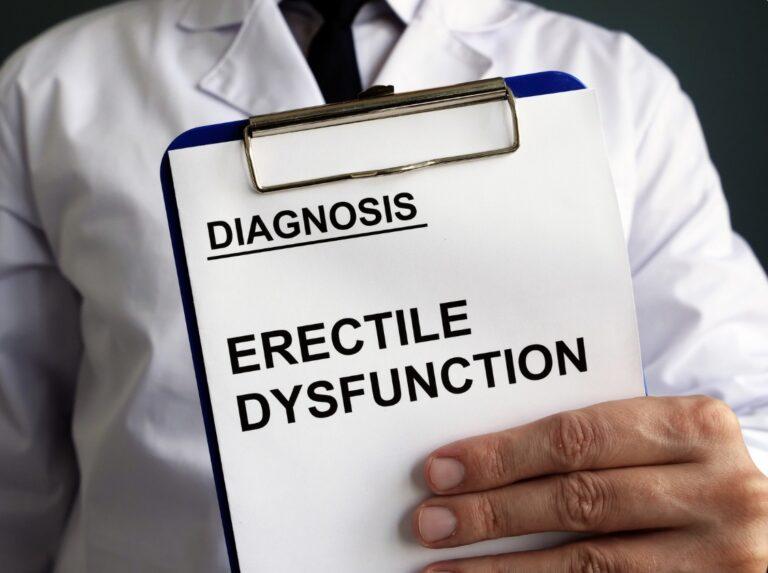While it might seem like a condition that only happens to older men, impotence is actually the same as ED. Here we’ll give you a rundown of the basics and let you know what you can do about it.
What’s the difference between impotence and erectile dysfunction?
You might have seen the term erectile dysfunction (ED) before. You may well be wondering what the difference between ED and impotence is?
The simple answer is, there’s no difference. Both terms refer to the same condition.
Impotence is the older name, and generally, people talk about ED today because impotence can be a loaded word for some people. It can be used as an insult, whereas ED sounds more neutral and medical, which is appropriate as it is a medical condition.
How common is impotence?
No one knows for sure. There’s been a lot of research into impotence, but some of it is old and outdated now. One major study found around 50% of men in their 50s experienced impotence, 60% of men in their 60s, and 70% in their 70s. So, impotence is common and becomes more so as we age.
Impotence used to be seen as something that just happens to older men, but today we know that isn’t true. Research has shown that lots of younger men experience impotence too and that it may be becoming more common. The increase in impotence in young men has been blamed partly on the easy access to pornography as well as other lifestyle factors.
Although we don’t know exactly how many men are impotent or suffer from it occasionally, we do know it’s common among both young and older men. In fact, impotence is the most common sexual problem reported by men. If you experience impotence, it may help to know you’re not alone.
What causes impotence?
Getting an erection might seem like a pretty simple process. You get aroused, your penis fills with blood, you get hard. Simple.
But erections are complex. There’s a lot more going on under the hood than you might think. Firstly, you need a heart and circulatory system that can pump enough blood to your penis to get and keep it hard. You also need a nervous system that can carry the right signals from your brain to your groin and the right levels of the right hormones, like testosterone. And even if all this is working fine, you also need to be in the right place mentally too.
Problems with any of the above can cause impotence. We’ll look at some of the conditions that can disrupt these processes and cause impotence:
Physical causes of impotence
- Conditions which can interfere with the flow of blood through your body, like heart disease, high blood pressure, high cholesterol, and diabetes
- Anything that impacts your brain and nerves, like strokes that cause brain damage, damage to your spine, multiple sclerosis, and Parkinson’s disease
- Conditions which impact your hormone levels, like low levels of testosterone, or an overactive or underactive thyroid gland
Psychological causes of impotence
A lot of sex is in your head. The desire for sex, confidence, your body’s physical reactions, they all begin in your brain. Anything which can disrupt your thinking and unsettle your mindset can impact your sex life and give you impotence. Some of these include:
- Stress in other areas of your life
- Problems in your relationship
- Performance anxiety (doubts about your sexual ability)
- Worries about premature ejaculation
- Addiction to pornography
- Mental health issues like depression and anxiety disorders
Lifestyle causes of impotence
Your lifestyle choices can also cause impotence or make it worse. All the following have been associated with impotence:
- Being overweight
- Not getting enough exercise
- Not eating a diet with enough nutrients
- Not getting enough sleep
- Smoking cigarettes
- Drinking alcohol
- Taking recreational drugs like marijuana and cocaine
- Taking medications that can cause impotence, like some antidepressants, antihistamines, and beta-blockers
These aren’t all the causes of impotence. This is just an overview of some of the possible culprits. You can read more about the causes of impotence here.
How to treat impotence
The good news is you have a range of options to treat ED. The treatment that works best for you will depend on what’s causing your impotence and your own tastes and preferences.
See your doctor
The first step you should take though is to see your doctor. Impotence can be caused by serious underlying medical conditions, so it’s a good idea to have a health check. Even if you think your ED is psychological, you should arrange a visit to see your doctor, as it can be caused by more than one thing.
Treating physical impotence
If your impotence is caused by a physical problem, ED medications like sildenafil (Viagra), tadalafil (Cialis), and vardenafil (Levitra) are effective treatments for many men. Other options include trying penis pumps, and even injections and implants.
ED medications will likely be the simplest and quickest place to start.
You can also make changes to your lifestyle. Things like eating a better diet, losing weight, getting more exercise, sleeping better, quitting smoking, and drinking less can all help. If you’re taking a medication that can cause impotence, you can talk to your doctor about your options.
If you think your impotence is psychological, then it may help to talk to a mental health professional. You can ask your doctor to refer you, or you can find a private therapist online.
Can Viagra help psychological impotence?
ED medications like Viagra can also help with impotence. For some men, they can take the stress out of getting an erection. This can help them relax and focus on sex, rather than the issues which are getting in the way of it.
If you’re interested in trying an ED medication, you can order them directly from us at NowPatient. Start your online consultation here. Simply enter your medical history and symptoms, and if approved by our doctors, you’ll receive a treatment plan within two hours. Your ED meds will be shipped to you for free within two days.
Sources
Medical Disclaimer
NowPatient has taken all reasonable steps to ensure that all material is factually accurate, complete, and current. However, the knowledge and experience of a qualified healthcare professional should always be sought after instead of using the information on this page. Before taking any drug, you should always speak to your doctor or another qualified healthcare provider.
The information provided here about medications is subject to change and is not meant to include all uses, precautions, warnings, directions, drug interactions, allergic reactions, or negative effects. The absence of warnings or other information for a particular medication does not imply that the medication or medication combination is appropriate for all patients or for all possible purposes.








